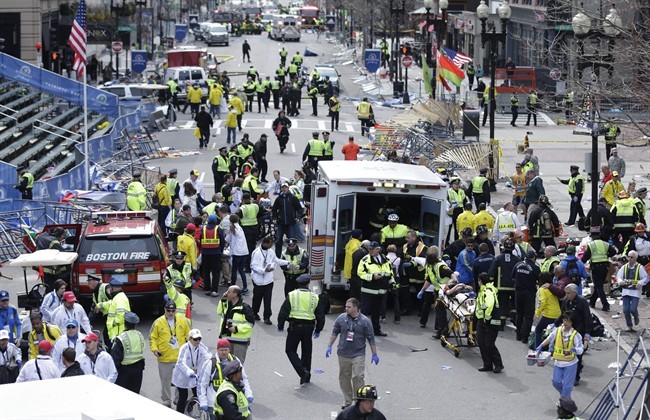TORONTO – As marathon runners crossed the finish line in Boston, two bombs blew up seconds apart at one of the world’s most storied races.

The Boston Marathon bombings shook the city, the United States and the rest of the world watching. Three people were killed and more than 260 people were injured, some of them even losing their limbs.
Now, a new study suggests that kids who were on the ground at the time and witnessed the tragedy first-hand were six times more likely to develop post-traumatic stress disorder than those who weren’t at the scene.
“There was an enormous mental health toll associated with direct exposure. And there was also a toll with kids exposed to the manhunt, which was an unfolding and uncontained situation that lasted much longer than the bombing itself,” Dr. Jonathan A. Comer told NBC News.
His research published Monday in the journal Pediatrics sheds light on the psychological impact the disaster left on children.

Get weekly health news
READ MORE: How the Boston Marathon bombings impact the public psychologically
It didn’t help that the incident was broadcasted on TV, online and all over social media. And it wasn’t just PTSD. “Children near and far throughout the Boston area showed a range of mental health problems, not just PTSD symptoms,” Comer told Health Day.
- Kate Middleton marks quiet return to work following cancer treatment
- Health Canada gives 1 year to remove BVO from drinks. What are the risks?
- ‘Deeply ashamed’: Canadian Medical Association apologizes for harms to Indigenous peoples
- Never heard of eastern equine encephalitis? Cases are ‘likely underreported’
He referred to conduct problems, peer problems, anxiety and moodiness as other examples.
His study is based on 460 parents and their kids between four and nine years old. They lived within 25 miles of the marathon or in the Watertown, Mass. area, where the manhunt unfolded.
The worst culprit was watching the news unfold on TV. After completing online surveys, Comer said he learned that most kids watched about 1.5 hours of coverage on the attack day, and about 20 per cent of the kids watched it for more than three hours.
Kids who watched the manhunt were more troubled than watching the actual bombing, Comer said.
At the time, parenting experts told Global News that families had to tread carefully in what information they were relaying to their kids.
READ MORE: How to talk to your kids about the Boston Marathon bombings
Following grisly events, such as the Sandy Hook school shooting and the Colorado theatre shooting, parents’ hands may be full in trying to explain these tragic events to their children.
“Whenever there’s a trauma like this, you only give as much information as (kids) need to know,” Dr. Oren Amitay, a registered psychologist told Global News.
“For a young child, they can’t process what’s happened like an adult so to them that kind of confrontation sounds like the entire world is a scary, unpredictable, dangerous place and they can be a victim at any point. You do not want to convey that to your child,” he said.
carmen.chai@globalnews.ca
Follow @Carmen_Chai






Comments